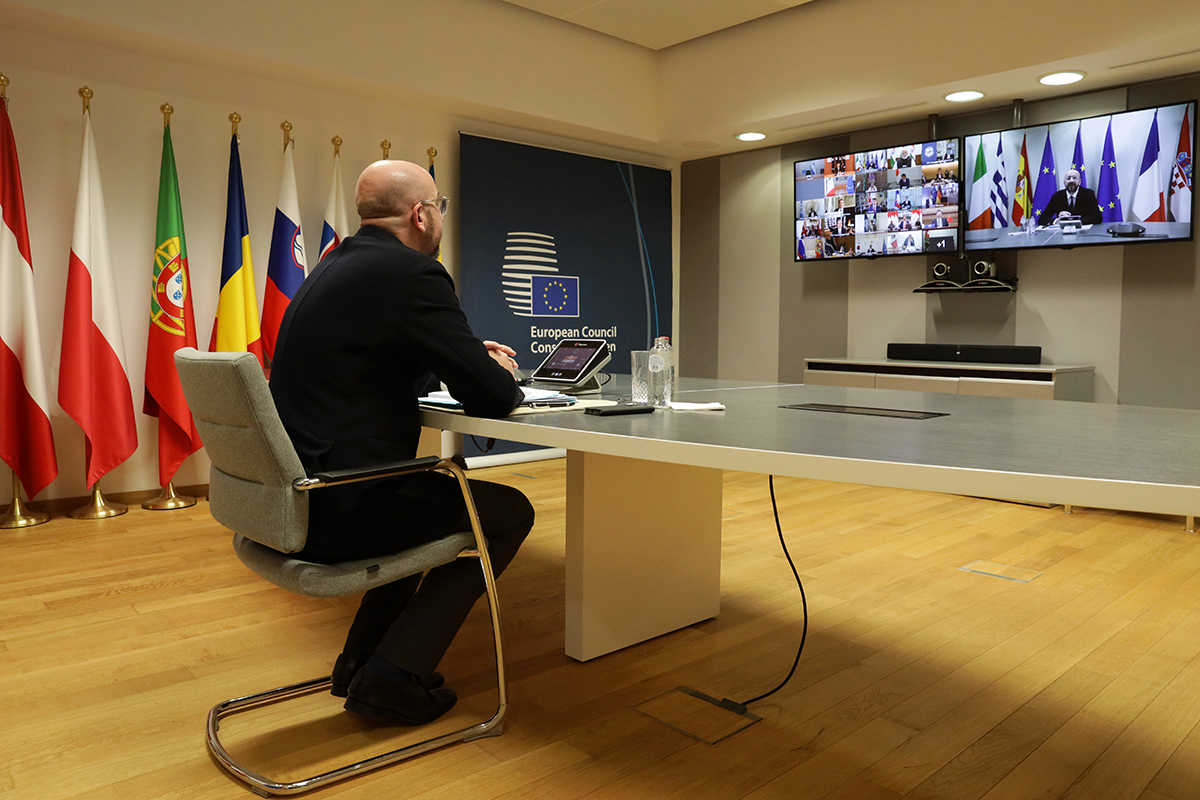BusinessEurope Headlines No. 2020-15
European CEOs statement on COVID-19: we need a strong Europe

Ahead of the EU leaders’ video conference meeting on 23 April, 23 European CEOs and Presidents published a joint statement urging the EU to work together to overcome the challenges the COVID-19 pandemic brings, and show that the EU is more than the sum of its members. “Member States have rightfully taken the lead in recent weeks, but this unfortunately leads us to a scattered landscape of measures”, the letter states. It adds that recovering from the crisis, only European solutions can work, putting the Single Market as the central instrument: “It is vital to ensure transportation of essential goods and flow of services across our borders, such as medical, pharmaceutical, food and energy”. The CEOs pointed out that the European Commission’s initiatives on Green Lanes and on the free movement of workers are highly welcomed to support the functioning of the Single Market. “We urge you to do your utmost to ensure that it delivers on the ground without delay”, they wrote.
![]() Contact: Alexandre Affre
Contact: Alexandre Affre
Photo copyright: European Union
Our comment
COVID-19: Trade is key for the economic recovery
By Luisa Santos, Deputy Director General and Director for International Relations
 There are voices saying that COVID-19 will put an end to globalisation and free trade, bring production back to Europe and encourage us to be less dependent of suppliers in China or India. As a first reaction to the pandemic, governments around the world started to introduce export restrictions both on medical devices and medicines needed to fight COVID-19, as well as on food. Many borders were closed, the movement of people and transport was restrained. This reaction was expected in the short term as a way to ensure there were enough means to fight the virus and that measures were in place to limit the spread of the disease. Governments needed to show citizens they were taking all necessary measures to protect them. But will these measures stay and will they be effective in the medium to long term?
There are voices saying that COVID-19 will put an end to globalisation and free trade, bring production back to Europe and encourage us to be less dependent of suppliers in China or India. As a first reaction to the pandemic, governments around the world started to introduce export restrictions both on medical devices and medicines needed to fight COVID-19, as well as on food. Many borders were closed, the movement of people and transport was restrained. This reaction was expected in the short term as a way to ensure there were enough means to fight the virus and that measures were in place to limit the spread of the disease. Governments needed to show citizens they were taking all necessary measures to protect them. But will these measures stay and will they be effective in the medium to long term?
The EU is already proposing to limit its initial export restrictions on personal protective equipment to cover only protective masks while broadening the number of humanitarian and geographical exemptions, for instance to include the Western Balkans. After an initial protectionist reaction we are now seeing an increasing number of countries around the world suspending tariffs and duties paid on goods that are needed to fight COVID-19. This is the recognition that trade is essential in fighting this pandemic and no country alone will be able to do it without importing some finished or semi-finished goods. Trade will also be key for the economic recovery.
The health crisis is not over yet but we all know that an unprecedented economic crisis will swipe the world, and Europe is no exception. We will need massive investments and financial support to mitigate the negative impact on companies and citizens. But we also need to keep trade and investment flows around the world to support the recovery. The most recent data published by the European Commission on 21 April shows that from January to February 2020 the Euro area exports to the rest of the world rose to €373,2 bn and imports fell to €348,4 bn, generating a trade surplus of €24,8 bn compared to €19,1 bn in 2019. The non-Euro area also experienced a similar trend. EU exports were growing before the crisis and they will be essential to support Europe’s economic recovery.
The COVID-19 will certainly lead to a reflection on alternative sources of supply and whether it makes sense to re-shore some production in Europe. However, with the economic crisis will come a cost pressure. How much consumers will be prepared to pay for goods produced in Europe and how viable will it be to produce certain goods in Europe are questions for which we don’t have yet an answer. One thing is certain: this crisis will not change the fact that in Europe we have mature markets and to sustain our economic recovery we will need access to emerging and fast growing markets. For this reason the EU needs to maintain an ambitious trade negotiation agenda that includes our major trading partners the USA and China as well as other partners that are key to ensure market diversification like Mercosur or Australia and New Zealand.
Contact: Luisa Santos
Unitary Patent system could play a role in the economic revival
 BusinessEurope published its statement on the Unitary Patent system on 23 April to emphasise that it deserves to go ahead without further delay and the necessary steps should be taken in order to allow this system to enter into operation as soon as possible, even after the recent decision of the German Constitutional Court. The Unitary Patent system is expected to minimise costs and administrative burden of patent protection in Europe, and ultimately to help boost growth and competitiveness of European businesses. Europe needs to rely on a strong R&D supportive and long-term stable framework. This is all the more the case since the Unitary Patent system would strengthen innovative businesses in Europe and thereby generate economic growth, which would certainly be needed for an economic recovery after the current COVID-19 crisis.
BusinessEurope published its statement on the Unitary Patent system on 23 April to emphasise that it deserves to go ahead without further delay and the necessary steps should be taken in order to allow this system to enter into operation as soon as possible, even after the recent decision of the German Constitutional Court. The Unitary Patent system is expected to minimise costs and administrative burden of patent protection in Europe, and ultimately to help boost growth and competitiveness of European businesses. Europe needs to rely on a strong R&D supportive and long-term stable framework. This is all the more the case since the Unitary Patent system would strengthen innovative businesses in Europe and thereby generate economic growth, which would certainly be needed for an economic recovery after the current COVID-19 crisis.
![]() Contact: Elena Bertolotto
Contact: Elena Bertolotto
Calendar 
- 24-26 April: Pan-European Hackathon
- 5 June: BusinessEurope Council of Presidents
- 22-26 June: EU Sustainable Energy Week 2020
- 9-10 September: 8th International Conference on Sustainable Development
Reminder: please have a look at our privacy policy